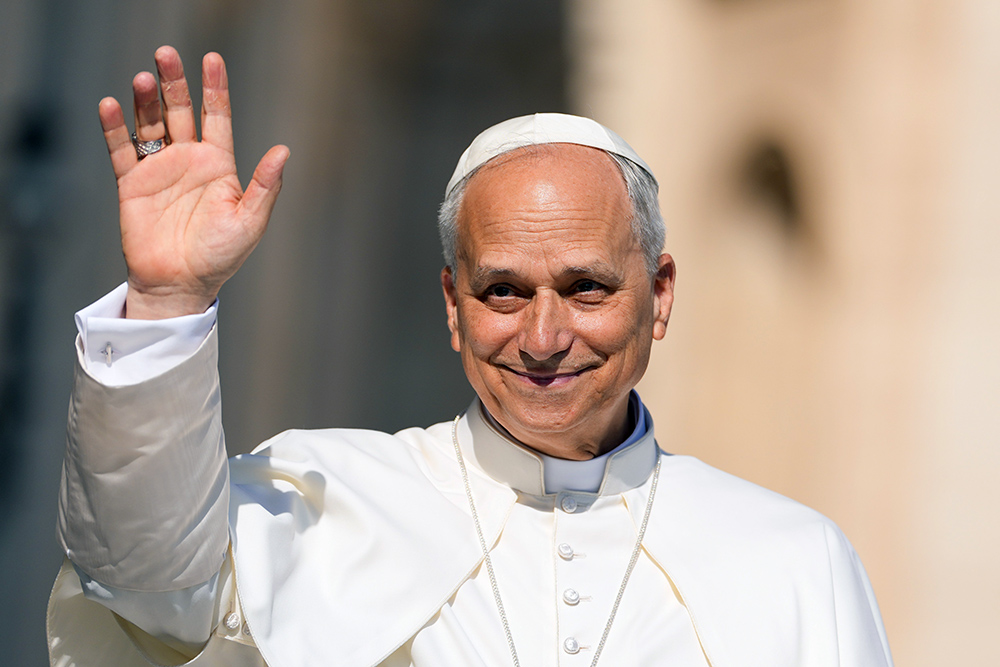
Pope Leo XIV greets visitors in St. Peter's Square before his general audience at the Vatican June 25, 2025. (CNS/Lola Gomez)
Pope Leo XIV is still keeping his cards close to his cassock, but people who have observed him over the years are beginning to help fill in the picture of what characteristics are likely to shape his pontificate.
Georgetown University's Initiative on Catholic Social Teaching and Public Life hosted a panel discussion about the new pope and, specifically, the connection between his election and the promotion of Catholic social teaching.
Redemptorist Cardinal Joseph Tobin, the archbishop of Newark, New Jersey, said that he thought the single most important thing people should know about the new pope is that "he has a good grip on the Catholic identity, and Catholic in the sense of not simply a series of norms or rituals but as a universal, a global perspective. And he's lived that and the church is going to be enriched by that."
Tobin recalled that, before the conclave, the cardinals focused on the needs of the church and that the quickness of the election was in part the fact that then-Cardinal Robert Prevost checked so many boxes: He has experience of pastoral ministry, he has been to the peripheries, he worked closely with Pope Francis, and he has knowledge and experience of the church in multiple countries.
Recalling Prevost's time as a bishop in Peru, Tobin said: "In a very divided episcopal conference, Bob was almost always elected to the leadership, somewhere in what they call the permanent council of the conference of bishops. And to me, I thought that was extraordinary for someone who was not born in Peru. Clearly, he has a broad degree of acceptance in the divided group."
John Carr, who founded the initiative and worked as the chief adviser on Catholic social teaching at the U.S. Conference of Catholic Bishops, seconded Tobin on the quickness of the election of Leo. Carr noted that the speed with which the cardinal electors converged on Prevost's candidacy demonstrated a high degree of global unity within the church.
Advertisement
Carr said that this global unity was "a challenge" for those U.S. Catholics who relentlessly criticized Francis. They are the outliers.
Christopher White, former Vatican correspondent for National Catholic Reporter and now associate director at the Georgetown initiative, was also on the panel. He said he thought the key word to understanding Leo is "missionary."
"He comes from working in the mission field and his lane is going to be looking at the least of those in society and figuring out how the church can best serve and promote those."
Emilce Cuda, secretary for the Pontifical Commission for Latin America, who worked closely with both Francis and Cardinal Prevost, echoed White about the importance of the peripheries, noting that Francis had been archbishop of Buenos Aires, the capital and largest city in Argentina, a cosmopolitan center, but Leo had served as a bishop of a poor, rural diocese that constituted a periphery.
She also noted that Leo will be different from Francis not only because of their different experiences and personalities, but because 2013, when Francis was elected, was a different time from 2025.
Overall, the panel highlighted the fact that we should look for significant areas of continuity between Francis and Leo, but that Leo will pursue some of those same agendas differently, with different emphases and a different style.
At Commonweal, Terrence Sweeney writes about the Augustinian order and how that influence is likely to shape the new papacy.
"To be Augustinian is to be shaped — like Augustine himself (not the order's founder but its inspiration) — by a deep sense of both interiority and community," Sweeney writes. "Augustine is known for writing the first personal memoir and the first soliloquy (a word he invented). He was always surrounded by a community of friends, and he articulated a deeply ecclesial understanding of Christ. Where some mystics have a personal, almost individualistic sense of the afterlife, Augustine famously described heaven as a city."
How could this affect Leo's leadership of the church in this historical moment?
"The Augustinian vision of community means, as Pope Leo puts it, 'we continue as a Church' — that is, 'as a community of friends of Jesus,' " Sweeney writes. "Pope Leo the Augustinian knows we will need this summons to real, incarnate friendship with each other and the Incarnate God. The world summons us into isolation with our devices. May Pope Leo the Augustinian summon us into communion with each and all."
At America magazine, they have been running a series of podcasts about the new pope, and Colleen Dulle has an article rounding up the five most surprising things she learned about Leo while working on the podcasts. The most important item, although not really surprising, came from Cuda, who, after describing her impressions gained from reporting to him the past two years when he was prefect of the Dicastery for Bishops, offered a caution: "Now we are speaking about Prevost, but Leo will not be Prevost. He will be Leo, the pope."
A prelate said almost the exact same thing to me when Cardinal Joseph Ratzinger was elected Pope Benedict XVI in 2005 and it proved very true.
Each of these comments about the new pope help fill out our picture of Pope Leo XIV, or help create the hermeneutic frame for understanding him. Both are important tasks and they are distinct. What is critical is that we all exercise some patience and let Leo show, rather than tell, who he is and, most importantly, where he wants to lead the church.





